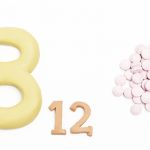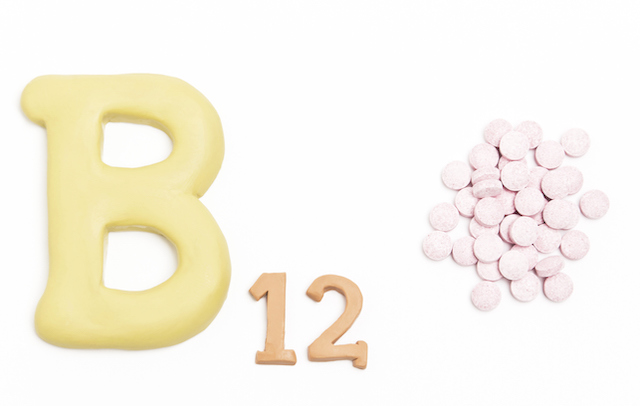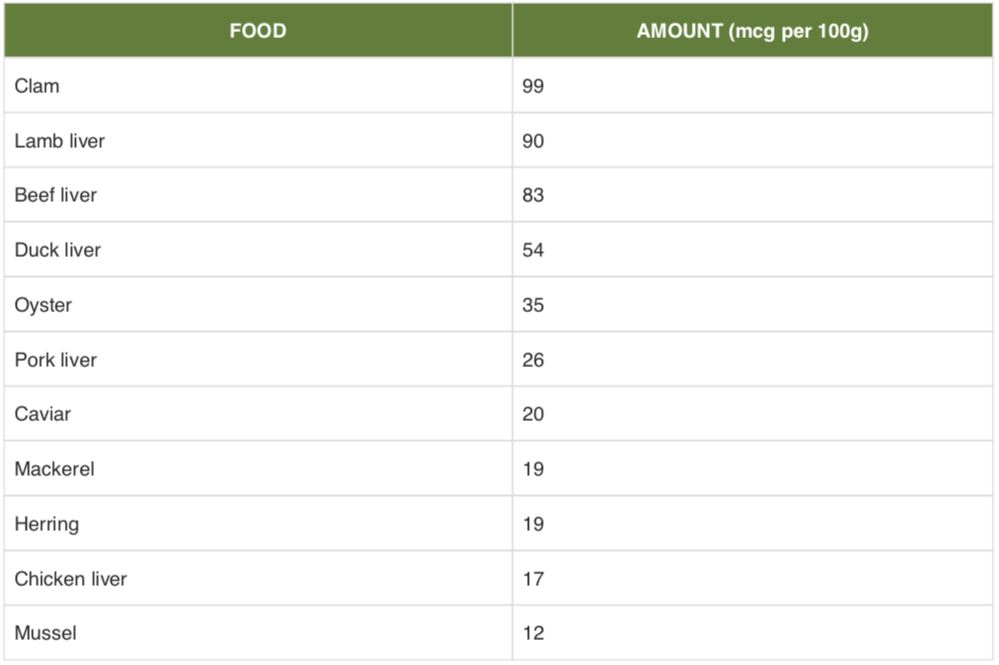Vitamin B12 deficiency manifests in many ways: fatigue, weakness, numbness and tingling in the hands and feet, memory loss, depression, anxiety, problems with walking, balance, and coordination. Treating the underlying cause of vitamin B12 deficiency will give you a more effective and lasting result versus treating the symptoms.
Causes of vitamin B12 deficiency
Not eating enough foods that have vitamin B12 in it
This is common in vegans and vegetarians because vitamin B12 is found only in animal products in a form called cobalamin. Plant sources such as seaweed, fermented soy, spirulina, and brewer’s yeast contain B12 in a form called cobamides. However, cobamides block the intake of vitamin B12 and can increase the need for true B12. (1)
When using more sensitive lab markers (holoTC, MMA, and homocysteine) to measure vitamin B12 levels, studies have found that up to 77 percent of vegetarians and 92 percent of vegans are B12 deficient, compared to just 11 percent of omnivores. (2, 3, 4)
Up to 77 percent of vegetarians and 92 percent of vegans are B12 deficient, compared to just 11 percent of omnivores.
Not absorbing enough vitamin B12 from diet because of Gut Disorders
This would include people that have gut disorders such as celiac disease or Crohn’s disease.
Celiac disease is an autoimmune condition caused by eating gluten (refined flours included in cereal, bread, crackers, pastries, pizza, beer, etc.). In celiac disease, the immune system attacks the lining of the intestine. I have written many articles on gluten intolerance if you want to dig deeper into this subject.
Crohn’s disease causes inflammation at the end of the small intestine. This is the part of the intestine where B12 is absorbed together with a chemical called intrisic factor.
Pernicious Anemia
Speaking of intrinsic factor, people with an autoimmune disease called Pernicious Anemia do not produce intrinsic factor. Intrinsic factor is required to absorb vitamin B12. The immune system attacks cells in the stomach that make intrinsic factor or attack the intrinsic factor itself.
Low Stomach Acid
Stomach acid, along with digestive enzymes, is needed to break down food into so that you can absorb all of the nutrients from it like vitamin B12.
Medications that lower stomach acid and provide heartburn relief can cause vitamin B12 deficiency. (5)
Atrophic Gastritis
Atrophic gastritis is a condition, often caused by H. Pylori in the elderly, where there is a loss of cells in the stomach that produce stomach acid. This leads to low stomach acid.
Other causes of low stomach acid include chronic stress and lack of sleep.
Decreased digestive enzymes
As mentioned previously, enzymes from your pancreas, work together with your stomach acid to break down food. If your pancreas isn’t releasing digestive enzymes that can lead to vitamin B12 deficiency.
Metformin
Metformin is a drug that depletes vitamin B12. If you are on metformin you would want to get your B12 levels checked regularly. If your levels are low you might have to co-manage your case with your medical doctor and supplement to get your B12 levels boosted.
Alcoholism
Alcohol reduces the absorption of vitamin B12 in the small intestine.
Variation in genes
Some people have genes (genetic polymorphism) that don’t allow them to metabolize vitamin B12 properly. This can lead to vitamin B12 deficiency.
Treating vitamin B12 deficiency
Once you know the underlying cause of vitamin B12 deficiency you can treat it more effectively.
Getting adequate intake
For those of you who may not be eating enough foods with vitamin B12 in it, you either have to up your intake of animal products and/or supplement with vitamin B12.
Here is a list of food sources high in vitamin B12 (cobalamin):
Shellfish and organ meats top the list as they do with a lot of nutrients. They are almost always the most nutrient dense foods you can eat. Muscle meats contain B12 but significantly less than organ meats.
For people with normal absorption, we recommend a daily intake of 17.6 mcg, which was the daily intake of our hunter gatherer ancestors. For people with impaired absorption, we recommend increasing daily intake to 150 to 200 mcg. This will likely require supplementation.
Remember, plant foods do not contain true B12. Vegans and vegetarians must supplement in order to get enough vitamin B12.
Supplementing with vitamin B12
By the way, vegans and vegetarians aren’t the only people who have to supplement with vitamin B12. If you look at the causes of vitamin B12 deficiency, this list doesn’t exclude people who eat animal products.
Four types of vitamin B12 supplements
There are four types of vitamin B12 supplements:
Cyanocobalamin is a synthetic form of B12 that is not absorbed very well.
The three natural forms of B12 are hydroxycobalamin, methylcobalamin, and adenosylcobalamin. These three forms absorb well. It is possible, because of genetic variation, that each form is converted differently from one person to the next. Also absorption may be different for each form. So the best approach would be to take all three. However, methylcobalamin supplements are the cheapest. So if you had to choose one, that would be it.
It is a good idea to supplement with folate as it required to help form and regenerate vitamin B12 (methylcobalmin). If you’re sensitive to folate supplements use either a methylcobalamin supplement or a combination of all three forms mentioned above.
I would advise a sublingual form (lozenges underneath the tongue) of vitamin B12 supplement. The B12 gets absorbed into your blood directly underneath the tongue so it bypasses your gut. This form allows you to get around gut absorption issues and pernicious anemia.
Dosages for vitamin B12 supplements
There is little to no concern overdosing with vitamin B12 supplements. Therapeutic dosages range from 3mg to 5mg per day. Lozenges are taken immediately after a meal.
In addition to B12, you may also want to supplement with betaine hydrochloric acid with pepsin and also take digestive enzymes to increase absorption. Do not take betaine HCl of you have gastric or duodenal ulcers and/or patients take NSAIDs.
How long do you have to supplement with vitamin B12?
For vegans, vegetarians, and people with pernicious anemia, supplementation with vitamin B12 would be ongoing. You would retest periodically (every 2 months to once a year) to see where your levels are at and adjust your dosage accordingly.
Vitamin B12 supplementation would be started for people who have deficiency because of other causes. If you fall into this category, you would have to address those other causes such as gut absorption issues. If you have addressed those other causes, you would stop supplementing with vitamin B12 and get retested.
If you take metformin, you can increase your calcium intake. Increasing your calcium, has been shown to reverse B12 deficiency caused by taking this drug. (6)
If you have had vitamin B12 deficiency for a long period of time you may need high doses of B12 for a long period in order to correct damage. However, some nervous system effects of B12 deficiency are irreversible unfortunately.
What about vitamin B12 injections?
By the way, sublingual vitamin B12 supplements have been shown to be as effective as vitamin B12 injections. (7, 8) However, if you are finding you’re not responding to oral or sublingual supplements, injections would be worth a try. B12 injections can be done by a doctor of naturopath or a medical doctor.
Summary
Treating the underlying cause of vitamin B12 deficiency such as gut absorption issues and supplementing properly will lead to an effective and long lasting result.




I have pernicious anemia. Working on healing my gut now. Can I reverse this ? I love your page.
Hi Colleen,
I’m not sure if you can reverse Pernicious Anemia. I would suggest you consult a naturopath or functional medical practitioner who has experience in treating Pernicious Anemia. However, you’re on the right track by healing your gut. Here’s a link that may help you: https://chriskresser.com/5-steps-to-personalizing-your-autoimmune-paleo-protocol/
Regards,
Dr. Collins
Thanks for the reply Dr Collins. Working with a Natropathic now. And he says possibly depending on the cause. Thank you for the link. And my apologies for just seeing this now ! 🙂
You’re welcome Colleen and I wish you all the best in improving your health.
Dr. Collins
I took now food digestive enzymes which contains both betaine and pepsin, my b12 shot up from being in 200s to 600-700s in just 3 months.. Even my iron went from 45 to 120! If I stop I’ll go back to the same old. Can digestive enzymes be taken long term? It seems that absorb my food so well through its support!
Hi Nikita,
That’s great news about your B12 levels. I can’t see taking them long term being an issue but I don’t know your underlying condition and health history. If I were you (if you haven’t already) I would consult a naturopath or functional medicine practitioner to figure out WHY you likely have low stomach acid production and low digestive enzyme production and fix the root cause.
Dr. Collins